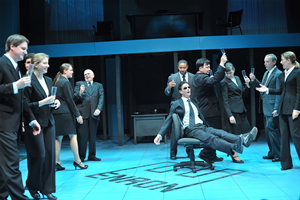Without ever meaning to, the Texas power company Enron was a precursor of events to come, when its meteoric rise came crashing down in the first years of the new century. The deception and hijinx that came to light in the demise of this seemingly golden boy of the energy world was laid at the feet of its corporate triumvirate: Ken Lay, Jeffrey Skilling, and Andrew Fastow. CFO Fastow turned state’s evidence and received a slap on the wrist; Ken Lay was stricken with a heart attack and died. Thus the entire enterprise was laid on the shoulders of CEO Skilling, who never did understand what it was that he did wrong. The hearings that came on the heels of this corporate bankruptcy coincided with the aftermath of the 9/11 Tragedy in New York; Skilling resigned as CEO of Enron less than one month before the towers fell. In light of the ten years that came afterward, Enron seemed to encompass all that was greedy and disastrous in the economy of Wall Street, and the nearly-disastrous melee that was to ensue beginning in 2008.
Enron has returned to the spotlight in a new work for theater by Lucy Prebble titled simply, Enron. Using high energy, musical-esque staging and choreography, Prebble tries to piece together the events that brought down this high-flying company and toppled the house of cards that Enron had become. The work is the opening show in the 15th season of Burning Coal Theatre Company and is a powerhouse of energy itself.
Directed by Artistic Director Jerome Davis, Enron roars to life at a party for the executives of a new and up-and-coming power company in Houston, 1990. Enron is now beginning to emerge as the powerhouse it will become, and the head of the company, Ken Lay (Mark Filiaci) has a decision to make. Does he go with the woman he is most comfortable with, the one whose head seems firmly attached to her shoulders; or does he go with the new-thinking and high-flying top of his marketing division, who thinks in terms of Mark to Market and Energy Trading. The decision he makes turns out to be disastrous, but not before Jeff Skilling (Nick Berg Barnes) makes Enron the top company on the Stock Exchange and makes the executives very, very rich.
We see the internal machinations of the Enron hierarchy as Skilling interacts with his antagonist Claudia Roe (Jenn Suchanec), and the free-thinker he raises up from downstairs in the accounting department, Andrew Fastow (John Allore) to become his CFO. Fastow is an imaginative man who is creative in his accounting; Roe is firmly based in reality and feels that on-the-ground tangibles are a better means of raising the company’s worth. Lay gives Skilling free rein to run a very questionable scheme designed to keep the stock high; it is the beginning of the very empty basis on which Enron’s cards are built.
Firing this high-energy play is an ensemble of thirteen actors who make up the rest of the cast of characters and the atmosphere of Wall Street in which Skilling seems to operate so well. A single father, Skilling teaches his daughter counting by using dollar bills and filling her head with strange examples of math like How Long Will It Take To Count Out A Million Dollars. His young daughter, superbly and sweetly played by Riley Watson, is a prime example of how those who are closest to Skilling have no idea of what is going on. The rest of the cast, however, is focused on Enron’s rocketing rise, and moves as only Wall Street can to take full advantage of the situation.
The remaining twelve cast members work tirelessly to keep the energy of the play at full throttle, changing scenes, attending parties, buying stocks, discussing the latest news, and working to keep Skilling and Co. moving forward at top speed. But Skilling and Fastow are beginning to realize that the cards are starting to topple, and they scramble to find a way to stay afloat as it all comes down upon them. When the CFO is sent to Fortune Magazine to explain all this, he fails miserably, and the truth begins to come out. Our Dirty Dozen cast members turn on the triumvirate and become severe Senate Hearing Heads, nailing the nails in the coffin of Enron and its downfall. In a correlation that is frightening, the fall of Enron and the fall of the Twin Towers seem to coincide perfectly.
The energetic ensemble that keeps the tension high and the energy flowing is made up of twelve ever-changing faces played by Jeff Agular, Gus Allen, James Anderson, Jade Arnold, George Kaiser, Whitney Madren, Julie Oliver, Benji Jones, Josh Silver, David Sweeney, Amanda Watson, and Christine Zagrobeiny. Staged on Burning Coal’s exceptional stage, the penthouse of Enron rises above the fray, over the underpinnings of the company down in the accounting department. This striking set, created by Drew Boyce, helps bring to life the otherwise enervating circumstances that create and destroy the company that is Enron.
Burning Coal has created a unique theater experience with Enron, using choreography and energy to bring to light that which most of us would like to forget. We would like to, but we cannot. Unless we understand and work to end the circumstances that allowed Enron to exist, we can only expect a repeat of ENRON with nothing more than a different name in the Stock Exchange. Something very like what happened to Enron took place on a much wider scale in 2008; it seems that Corporate America is not likely to learn from its mistakes without a very, very harsh reality check.











